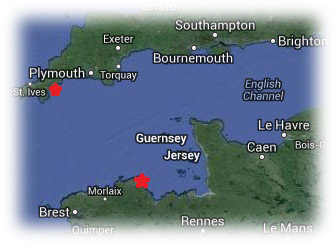Inexperience can quickly turn a bad situation an awful lot worse.
The story of my first night sail is, therefore, also the story of my worst night sail.
 I’ve not done a huge amount of night sailing truth be told. I’m the breed of sailor who favours a hot shower and a cold beer well before the sun goes down. Let’s face it, they call it the “end” of the day for a bloody good reason.
I’ve not done a huge amount of night sailing truth be told. I’m the breed of sailor who favours a hot shower and a cold beer well before the sun goes down. Let’s face it, they call it the “end” of the day for a bloody good reason.
But for any serious sailor, no matter how hardened a nocturnal landlubber you may be, sometimes there’s just no avoiding it. Time and tide catches us all in the end – a lengthy passage you just can’t do in a day, an absence of convenient ports of call to break your journey down or the need to make a certain landfall by a particular time can make pulling an all-nighter unavoidable.
And then again, there are some insane buggers who actually want to do it!
So, you’re facing your first night sail and you kinda know some of the things to expect. Like darkness, by way of an obvious example, with the challenges of picking out shipping by their twinkling, far-off lights, navigating out of site of land even though you are close enough to see it (and indeed hit it) and steering choppy seas when you can’t see the waves.
Serious sailing students may even have read up a bit on the subject and acquainted themselves with the advice of seasoned, world-girdling sailors and thus thoroughly prepared themselves for the surprisingly deep cold, schooled themselves in cabin-light etiquette to preserve the night-vision of the on-watch crew and armed themselves with an appetising range of cup-a-soups to see them through to Armageddon should the need arise.
Sailing students like myself, on the other hand, who favour the more colourful and effort-light approach of half-arsing it through their lives, probably didn’t get that far through the books.
So I thought I’d share a few reminiscences from the few times I’ve been the last man to take a step backwards when night-sailing volunteers were called for.
Starting with my first time.
And unquestionably my worst time.
Cold
My first night passage was across the English Channel, an estimated 18 hour sail from Brittany in the North of France to the South Western tip of England – Falmouth if the winds were kind, Penzance if not.
 Having set off in choppy seas, sundown found us in more settled conditions close-hauled but nicely on-track for our destination and barrelling along at a healthy 7 knots or so.
Having set off in choppy seas, sundown found us in more settled conditions close-hauled but nicely on-track for our destination and barrelling along at a healthy 7 knots or so.
The skipper had whipped up a blokeish one-pot concoction of baked beans, boiled potatoes and corned beef so the crew were warm and well fed as the sun disappeared over the horizon and I readied myself for ship-spotting duty.
The straightforward way to detect a potential collision situation at sea is to determine if another boat is on a steady and constant bearing to yourselves. The positive way to do this is with a hand-bearing compass, though if you’re sailing a steady course, which often depends on the competence of the helmsman, you can use a stanchion or some other bit of the rigging to line up with the other vessel and see if it changes over time. If it doesn’t then eventually you’re going to hit it.
Armed with a virgin’s enthusiasm and innocence I set about this task with an enthusiasm totally unshared by my crewmates. In fact my regular shipping news updates seemed nothing more than an irritation. Sailors on passage are typically a quiet, reflective bunch and my little updates were, I felt, rather spoiling the peace and quiet.
Yes, okay, what I was pointing out on the horizon was blindingly obvious to anyone else on-deck at the same time. But aren’t two eyes better than one when danger is all about? Our lives might depend on it, right?
Well, sometimes.
Maybe.
The comfortable, confident indifference of those around me was as infectious as their contempt was informative. I decided a more casual approach of keeping an eye open and my mouth shut was a good idea. It might at least avoid an impromptu man-overboard drill!
I had a quiet respect for their confident and casual approach to our overnight passage too, though I felt a little differently about it by the morning.
Colder
Another thing the books are very keen on is sorting out your watch rota. Making sure everyone knows what they’re responsibilities are, when they’re supposed to be on deck and when they should be kipping down below. This was an aspect of “the books’ that our skipper and first mate definitely didn’t seem to care for.
Midnight came, midnight went. The hours slowly rolled on and the seas remained safe and quiet. The skipper went down below for a sleep, the first mate dozed in the cabin and occasionally stuck his head up for a shufti at the horizon. Nothing was said. We just sailed and I was just ignored.
The temperature dropped steadily as the night wore on. It’s always colder at sea, especially at night and especially sailing, with rather relies on a steady supply of body temperature reducing wind. I found myself a cubby-hole in the lee of the spray-hood and kept my silent, uncomplaining vigil, checking the horizon and the course every few minutes as the night rolled on.
Colder still
As the sun rose so did the skipper and the first mate, refreshed and recharged. Falmouth was out and we came off the wind a little to meander along the now clearly visible English coast towards Penzance. An hour or three would see us make our landfall.
I can’t say I cared. Nor did they care that I didn’t care. I think they just appreciated the fact I was willingly quiet for a change.
To this day I’m not sure whether the way I felt that morning was the result of mild hypothermia or simply a lack of sleep. The symptoms aren’t that dissimilar after all. I was struggling to keep my eyes open but unable to get to sleep, I was cold through-and-through, sluggish and miserable. As a crewman I was next to useless. At least I’d stopped shivering, but when it comes to hypothermia that isn’t a very good sign!
Fortunately I wasn’t really needed and, this being August, the warmth of the early morning sun gradually brought me back to life in time for Penzance and a safe, if slightly chaotic landfall.
Cooked breakfast anyone?
Captain Ben’s top tips for night sailing – part one
Sailing at its best is all about new experiences, and the substantially different character of night sailing makes it one not to be avoided.
If you’re contemplating crewing a night-passage then you can leave preparing the boat to the skipper and focus on preparing yourself. Here are the first few of Captain Ben’s top tips to help you on your way:-
- Keep the cold out
Okay, Captain Ben is a scrawny wee bugger. 5’8″ and 140 pounds means I’m not carrying an awful lot of insulation around with me. I hate the cold at the best of times, and at sea overnight cold is there in spades. Even in the summer, even in hotter parts of the world, it’s always like that. And if let yourself get too cold at sea at night in a small boat there aren’t a lot of ways for you to get warm again. Layers, layers and more layers are the key, and if you feel yourself getting cold, add some more right away. I was next to useless by dawn on this trip and while I wasn’t needed for anything we’d have been in poor shape if I had been. Letting yourself get too cold isn’t just unpleasant, it’s bloody dangerous too and you’re not taking your responsibility as crew seriously if you do. - Get some sleep
I’ve never let myself go a night without sleep since and I can tell you that just an hour or two makes a world of difference to how you feel come daybreak. Whether it’s just the psychological affect of clearly breaking yesterday from today, or whether you really do get a physiological boost from a single fix of REM sleep I can’t say, but the difference is phenomenal. Make sure you get at least a little shut-eye. - Understand your responsibility
As a crew-member it isn’t really your place to insist on a clear watch rota and my popularity would doubtless have suffered still further if I’d tried. It’s the skippers business how he runs his boat, it’s your business how you run your life. If the skipper is content with a casual “we’ll just sort it out amongst ourselves” attitude that’s his decision and his responsibility. Yours is to make sure you get what you need out of it to be as comfortable as everyone else and as effective as them too. This was my rookie-error on this trip. - Chilling with the shipping
Except in extremes of low visibility or heavy weather, spotting other vessels at night with oodles of time to spare is not a problem. So long as you can tell the difference between red and green and understand your relative bearing you know everything you’ll need to spot the danger signs and so long as you know how to steer in that situation you’ll be fine. Contrary to what you might expect, big ships can often see you on radar and may well alter course to avoid you so remember to steer within the “rules of the road” when you have to in order to avoid the “two men meeting in a doorway” comedy of errors.